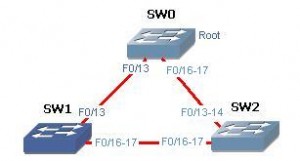How-to: Configure Spanning Tree Protocol Part3
After explaining how STP works to ensure your network is free of bridging loops in previous posts, we are going directly to a configuration example. We will use a simple topology in the diagram below and configure the switches to accomplish the tasks listed below.
Task1: Configure SW0 as a root bridge for both VLAN1,2.
For SW0 to be a root switch you have to manipulate the BID to make it the lowest in the network. The command spanning-tree vlan 1,2 root primary is used to automatically set the priority.
SW0(config)#spanning-tree vlan 1,2 root primary
Task2: Configure SW1 as a backup root bridge for VLAN1 only.
For SW1 to act as a backup in case of SW0 failure; its BID value must be manipulated to be lower that SW2 but higher than SW0. You can use the command spanning-tree vlan 1 root secondary to accomplish the task automatically.
SW1(config)#spanning-tree vlan 1 root secondary
Task3: Configure SW2 F0/14 as a root port for both VLAN1,2.
Root port election is based firstly on the lowest cost, but in our case both ports (13,14) have the same cost and both are connected to the same bridge, so if everything was left to default F0/13 will be elected as a root port using the last tie breaker (lowest PID). This task can be configured by manipulating port cost or PID. Let us will use the port cost method for VL1 and the PID to the VL2.
!--- increase the cost of f0/13 over 19 or lower the cost of f0/14 below 19 SW2(config-if)#int f0/13 SW2(config-if)#spanning-tree vlan 1 cost 100 !--- PID must be configured on SW0 not SW2 SW0(config)#int f0/17 SW0(config-if)#spanning-tree vlan 2 port-priority 64
Task4: Make sure SW1 is the designated switch for the segment between SW1&SW2 for VLAN1
Changing the priority on SW1 in task2 ensures that it has a lower BID for VLAN1 than SW2, hence it is selected as a designated switch and its ports are in the forwarding state.
Verification and Troubleshooting:
- SW0 is root bridge for both VLAN1,2 and all its ports are in the forwarding state as shown below.
SW0#show spanning-tree vlan 1,2
VLAN0001
Spanning tree enabled protocol ieee
Root ID Priority 24577
Address 001b.90b4.6900
This bridge is the root
Hello Time 2 sec Max Age 20 sec Forward Delay 15 sec
Bridge ID Priority 24577 (priority 24576 sys-id-ext 1)
Address 001b.90b4.6900
Hello Time 2 sec Max Age 20 sec Forward Delay 15 sec
Aging Time 300
Interface Role Sts Cost Prio.Nbr Type
---------------- ---- --- --------- -------- --------------------------------
Fa0/13 Desg FWD 19 128.15 P2p
Fa0/16 Desg FWD 19 128.18 P2p
Fa0/17 Desg FWD 19 128.19 P2p
VLAN0002
Spanning tree enabled protocol ieee
Root ID Priority 24578
Address 001b.90b4.6900
This bridge is the root
Hello Time 2 sec Max Age 20 sec Forward Delay 15 sec
Bridge ID Priority 24578 (priority 24576 sys-id-ext 2)
Address 001b.90b4.6900
Hello Time 2 sec Max Age 20 sec Forward Delay 15 sec
Aging Time 300
Interface Role Sts Cost Prio.Nbr Type
---------------- ---- --- --------- -------- --------------------------------
Fa0/13 Desg FWD 19 128.15 P2p
Fa0/16 Desg FWD 19 128.18 P2p
Fa0/17 Desg FWD 19 64.19 P2p
- SW1 is a backup for the root bridge for VLAN1 only.
- SW1 is the designated switch for VLAN1 and both ports f0/16-17 are forwarding for VL1.
SW1#sh spanning-tree vlan 1,2
VLAN0001
Spanning tree enabled protocol ieee
Root ID Priority 24577
Address 001b.90b4.6900
Cost 19
Port 15 (FastEthernet0/13)
Hello Time 2 sec Max Age 20 sec Forward Delay 15 sec
Bridge ID Priority 28673 (priority 28672 sys-id-ext 1)
Address 001b.904f.ec00
Hello Time 2 sec Max Age 20 sec Forward Delay 15 sec
Aging Time 300
Interface Role Sts Cost Prio.Nbr Type
---------------- ---- --- --------- -------- --------------------------------
Fa0/13 Root FWD 19 128.15 P2p
Fa0/16 Desg FWD 19 128.18 P2p
Fa0/17 Desg FWD 19 128.19 P2p
VLAN0002
Spanning tree enabled protocol ieee
Root ID Priority 24578
Address 001b.90b4.6900
Cost 19
Port 15 (FastEthernet0/13)
Hello Time 2 sec Max Age 20 sec Forward Delay 15 sec
Bridge ID Priority 32770 (priority 32768 sys-id-ext 2)
Address 001b.904f.ec00
Hello Time 2 sec Max Age 20 sec Forward Delay 15 sec
Aging Time 300
Interface Role Sts Cost Prio.Nbr Type
---------------- ---- --- --------- -------- --------------------------------
Fa0/13 Root FWD 19 128.15 P2p
Fa0/16 Altn BLK 19 128.18 P2p
Fa0/17 Altn BLK 19 128.19 P2p
- F0/14 on SW2 is a root port for both VL1 and VL2.
- SW2 is the designated switch for VL2 without any configuration (lower MAC).
SW2#sh spanning-tree vlan 1,2
VLAN0001
Spanning tree enabled protocol ieee
Root ID Priority 24577
Address 001b.90b4.6900
Cost 19
Port 16 (FastEthernet0/14)
Hello Time 2 sec Max Age 20 sec Forward Delay 15 sec
Bridge ID Priority 32769 (priority 32768 sys-id-ext 1)
Address 001b.904f.cc00
Hello Time 2 sec Max Age 20 sec Forward Delay 15 sec
Aging Time 300
Interface Role Sts Cost Prio.Nbr Type
---------------- ---- --- --------- -------- --------------------------------
Fa0/13 Altn BLK 100 128.15 P2p
Fa0/14 Root FWD 19 128.16 P2p
Fa0/16 Altn BLK 19 128.18 P2p
Fa0/17 Altn BLK 19 128.19 P2p
VLAN0002
Spanning tree enabled protocol ieee
Root ID Priority 24578
Address 001b.90b4.6900
Cost 19
Port 16 (FastEthernet0/14)
Hello Time 2 sec Max Age 20 sec Forward Delay 15 sec
Bridge ID Priority 32770 (priority 32768 sys-id-ext 2)
Address 001b.904f.cc00
Hello Time 2 sec Max Age 20 sec Forward Delay 15 sec
Aging Time 300
Interface Role Sts Cost Prio.Nbr Type
---------------- ---- --- --------- -------- --------------------------------
Fa0/13 Altn BLK 19 128.15 P2p
Fa0/14 Root FWD 19 128.16 P2p
Fa0/16 Desg FWD 19 128.18 P2p
Fa0/17 Desg FWD 19 128.19 P2p
Thats all for this post, I hope it was clear enough to improve your understanding of STP. In coming posts we may explore more subjects related to STP.


